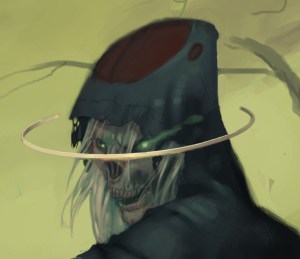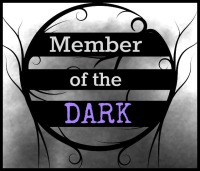Due to being busy with things and heading out for the weekend, I’m going to keep the ‘Post Revisits’ going for today. This one was originally posted on January 2, 2013.

Art by Jason Pedersen
I read a post about the characteristics of heroes and it got me thinking about the other side of the equation. How do you write a good villain? I always had more interest in villains than heroes because I realized that a hero has nothing to do without a villain. I guess you can say that a hero is only as good as his villain or rogues gallery. Many villains even go on to be more famous than their heroic counterparts. For example, most people think Darth Vader when you mention Star Wars before they think of Luke Skywalker. Lex Luthor and Doctor Doom seem to have more respect than Superman and Mr. Fantastic. I think this proves that while an audience is not supposed to like the villain, there is something about a good bad guy that can drive a person’s interest more than a good hero.
So, what actually makes a good villain? I can list off attributes, but most villains possess most of them. Even a villain that is as inept as Mum-ra is evil, mean, dastardly, and cruel. Thinking about it, most cartoon villains seem to have a level of ineptness that they lose if they go into another medium. Cobra Commander was effective in the comics, but he was a buffoon in the cartoon. At least, I thought he was and I always wondered why Destro never shot him in his sleep. Though given how nobody could hit anything in that show, I wouldn’t be surprised if he tried it every night. Anyway, this really makes me wonder how a villain can be considered a good or bad character in terms of quality. Is a villainous laugh necessary or can they get away with a banshee scream of rage whenever they’re upset? Do the better villains have to be able to fight when cornered or can a great villain be a manipulator with not combat skills? Maybe it even comes down to personal choice.
I’m going to say that my opinion of a villain is dependent on his or her actions. A villain has to do bad things and show very little, if any, remorse about his or her actions. Darth Vader killed his own men throughout Empire Strikes Back, which always cemented his evilness to me. Frieza killing Krillin (not sure why the high-pitched bastard waiting so long to do a one-shot kill) was a defining moment of Dragonball Z. These are actions that you can look at and say ‘that is one cold-hearted, evil bastard. I guess a great villain needs at least one scene where you can say without a doubt that they are the villain and have to be taken down. You need that event to make the audience cheer for the villain’s defeat instead of being apathetic to their fate or even rooting for them. It’s something that needs to be done with subtlety because I have seen a lot of villains who came off as heavy-handed. The movie or show basically shouts, ‘This is the villain! Do not cheer for this character!’ Yet, the villains didn’t really do anything for me to be turn against them. Best example of a poor villain for me is from the movie Brave that I just watched. I loved Merida, but I couldn’t figure out who the villain was supposed to be. The ‘villain’ shows up in the final hour for a big fight and I was left wondering if I was supposed to care that this ‘villain’ just got defeated. It hadn’t really been a factor for the entire movie, so there was no scene that cemented it as the bad guy and no build up to the defeat. It just showed up near the end and needed to be defeated.
All of my examples have been movie or cartoons because it is easier to show a villain as evil than telling a person that a character is evil. You can do the same scenes to prove that they don’t care about their pawns, but I think there is something more that you need for a literary villain. It isn’t enough to have them act evil, but they have to feel evil. Sneers, hisses, threatening words, and evil forms of laughter are good methods as long as you don’t overdo them. For the fantasy genre, it always helps to have your villains in a dungeon or necromantic lab. I guess being surrounded by dead bodies is a time-tested method of declaring, ‘This character is evil!’ I like to write villains because they tend to have the more colorful dialog, but I still don’t think I have a good grasp on what makes them evil. The Lich in my story is obviously evil because he’s a rotting necromancer who summons demons, but his allies that show up in later stories don’t have the same look of horror. The big villain is actually attractive, so I’m having a challenge trying to demonstrate that he’s evil. He’s actually starting to become one of those villains that is polite and charming, which is a total change from the Lich’s stereotypical villainy.
So, what do you think makes a great villain?





I loved Mum-Ra! I feel very nostalgic now 🙂
LikeLiked by 1 person
I miss that show. They did a remake of it a few years back, but I don’t think it lasted.
LikeLike
Never quite the same when they do a remake *sigh*
LikeLike
Nope. They tried it with He-Man too. Guess a lot of people try for nostalgia.
LikeLike
The Clangers are coming back, though. Not quite the same as Thundercats or He-Man but I am looking forward to it rather more than I should!
LikeLike
Never saw that one. Doesn’t look like it got to the States.
LikeLike
Ah, quite possibly not. It was about knitted pink creatures living on the moon. Very surreal indeed.
LikeLike
Interesting. Might have to look that up on YouTube. Seems everything gets a chance at a comeback.
LikeLiked by 1 person
Personally, I just love the contrast between a villain’s likable exterior and dastardly deeds. I also like my villains complex. They need at least one redeeming quality, to make them rounded.
Having said that, there’s no denying the sheer pleasure to be had with villains like Jabba the Hut… 😀
LikeLike
There is something about the irredeemable that makes them fascinating to watch. I’m thinking of Carnage from the Spider-Man comics. I always enjoyed his appearances because there was no reasoning with him or any ‘nice’ quality to take advantage of like the other villains. He was a monster, which causes a hero to work with a different mindset that doesn’t always click.
LikeLike
I agree with Nicholas. My favourite villains are those who try, and fail to fight the darker side to their nature, or those who have tremendous inner turmoil. I’m not really sure why people are drawn to villains. I think of characters such as the Joker from Batman. I mean he’s despicable, he really is, and yet I like him, and that makes absolutely no sense. Is it his torment, his sick and often twisted humour, the way he lights up a comic or the screen? Then there are those like Loki; his arrogant flair and exhibitionism. He’s like a spoilt child, and yet there is just something which draws me in. That said, I found your comment about villains outshining the heroic counterparts interesting. When I think Superman I imagine CK and when I think Star Wars, it’s Hans Solo! But I see your point. If you speak of the first Avengers movie, many people will think immediately of Tom Hiddleston. Perhaps its the emotions they evoke; they sure get our adrenalin pumping!
LikeLike
It might also be that the villains tend to be the more outlandish or scene stealing. They have fewer appearances in a story, so each one needs to be special with a lasting impact. This keeps them in the reader’s mind for longer. They also grow less than heroes, who you get a more inside look too. The villains have an odd honesty to them.
LikeLiked by 1 person
That’s true, and a really good point 😀
LikeLike
A great villain is one does not see his or her actions as villainous. He/she believes he/she is doing the right thing. Syndrome of The Incredibles is one of my favorite villains. Darkseid in the DC world is another great villain.
LikeLike
Never realized Darkseid claims to be noble. Thought he was evil and proud of it like Thanos.
LikeLike